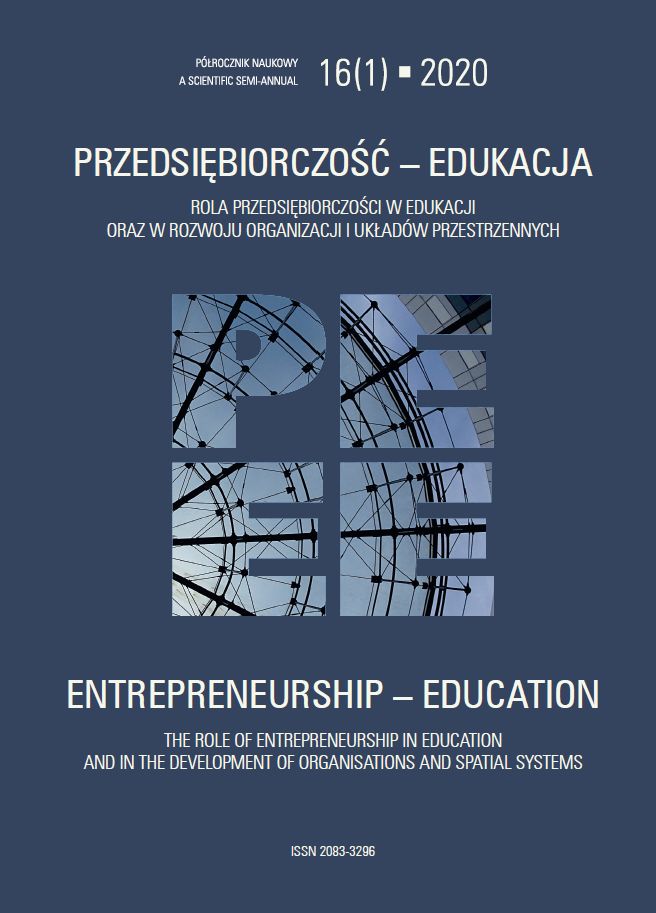Benefits Resulting from Maintaining a Relationship between Economic Universities and Their Alumni: the Case of the Warsaw School of Economics
DOI:
https://doi.org/10.24917/20833296.161.8Słowa kluczowe:
alumni, friend-raising, fundraising, good practice, universityAbstrakt
Alumni are more and more often perceived as the most important asset of a university, crucial for the implementation of its strategic goals. Polish economic universities, in comparison to American and many European ones, have much to catch up on in this area. The problem is not only that funds are too small in relation to the needs. There is a lack of systematised knowledge about the possible benefits of maintaining a relationship between universities and alumni, as well as the lack of developed models for this cooperation. The aim of the article is to assess the benefits of cooperation between universities of economics and their alumni taking into account the benefits for the university, its alumni and present students, and to identify good practice in this area. The research method was based on the analysis of the results of a survey conducted online from 28 universities in 19 countries. An additional source of information was the literature, websites, a diagnosis of the situation at the Warsaw School of Economics (SGH) and the experience of the authors who have visited some of the foreign universities. As a result of the analysis, it was found that universities are aware of the benefits of maintaining relationships with alumni. The quality of this cooperation is not satisfactory and action is necessary to organise it better. In the case of the SGH, which has been subject to a detailed analysis, there is no clear definition of the goals for maintaining relationships with alumni. The priority should be to develop a long-term strategy leading to organising these relations and outline a desired model of cooperation.
Bibliografia
Bryła, P., Jurczyk, T., Domański, T. (2013). Korzyści współpracy uczelni wyższych z otoczeniem gospodarczym – próba typologii. Marketing i Rynek, 4, 14–19.
Cannon, T. (2015). The importance of the alumni network. Retrieved from: https://www.redbrickresearch.com/2015/10/29/the-importance-of-the-alumni-network/
Coll, G., Tsao, J. (2005). To give or not to give: Factors determining alumni intent to make donations as a PR outcome. Journalism & Mass Communication Educator, 59(4), 281–392.
Diagnoza potrzeb uczelni, studentów i absolwentów w zakresie budowania trwałych relacji uczelnia – student – absolwent opartych na wzajemnej wymianie wiedzy i doświadczenia. Raport z badania pogłębionego. (2013). Warszawa: Collegium Mazovia.
Daly, S. (2013). Philanthropy, the new professionals and higher education: the advent of Directors of Development and Alumni Relations. Journal of Higher Education Policy and Management, 35(1), 21–33. Retrieved from: http://dx.doi.org/10.1080/1360080X.2012.727701
Feudi, J.A., Clifford, P.J. (eds.) (2002). Alumni Clubs and Chapters. New York: CASE.
Harrison, W.B. (1995; 2019, 27 January). College Relations and Fund-Raising Expenditures: Influencing the Probability of Alumni Giving to Higher Education. Economics of Education Review, 14(1), 73–84. Retrieved from: https://doi.org/10.1016/0272-7757(94)00035-5
Hashim, N., Kee, P.Ch., Rahman, M. (2014). Attempt to Solving Situational Problem of Alumni Employability. Social Behavioral Science, 155, 380–385.
Kamiński, T. (2014). Uczelnie i absolwenci – dobre praktyki. Retrieved from: http://obywatelenauki.pl/2014/06/uczelnie-i-absolwenci-dobre-praktyki-tekst-tomasza-kaminskiego/
Kuźnar, A., Żukowska, J. (2018). Dobre praktyki w zakresie relacji szkół wyższych z absolwentami w świetle wyników badań empirycznych. Horyzonty Wychowania, 17(43), 157–165. doi: 10.17399/HW.2018.174313
Levine, W. (2008). Communications and alumni relations: What is the correlation between an institution’s communications vehicles and alumni annual giving?. International Journal of Educational Advancement, 8(3/4), 76–197.
Łazorko, K. (2016). Działania marketingowe ukierunkowane na absolwentów uczelni wyższych w Polsce – diagnoza głównych problemów. Handel Wewnętrzny, 2(361), 280–290.
Meer, J., Rosen, H.S. (2012). Does Generosity beget Generosity? Alumni giving and undergraduate financial aid. Economics of Education Review, 31, 870–907.
Murray, S. (no date). Learning from the American Fundraising Model: A European Perspective. King Baudouin Foundation United States. Retrieved from: https://kbfus.org/document/learning-american-fundraising-model-european-perspective/.
Muller, S., (1986). The Definition and Philosophy of Institutional Advancement. In: A.W. Rowland (ed.) Handbook on Institutional Advancement, 2nd ed., San Francisco: Jossey-Bass.
Parsons, P., Wethington, D. (1996). Fund-raising appeals to alumni: Two experiments. Journalism & Mass Communication Educator, 52(1), 44–50.
Pérez-Esparrells, C., Torre, E.M. (2012). The Challenge of Fundraising in Universities in Europe. International Journal of Higher Education, 1(2), 55–66.
Rissmeyer, P. (2010). Student Affairs and Alumni Relations. New Directions for Student Services, 130.
Stevick, T.R. (2010). Integrating Development, Alumni Relations, and Marketing for Fundraising
Success, New Directions For Higher Education, 2010(149), 57–64. Retrieved from:http://dx.doi.org/10.1002/he.381
Studiuj praktycznie. (2018). Retrieved from: http://firma.sgh.waw.pl/pl/sp/Strony/default.aspx
Tett, G. (2012; 1 February). Charity begins with a tax break. Financial Times. Retrieved from: https://www.ft.com/content/3b2b3bb2-9a3d-11e1-aa6d-00144feabdc0
Pobrania
Opublikowane
Jak cytować
Numer
Dział
Licencja
Artykuły publikowane są zgodnie z warunkami licencji Creative Commons (CC BY-ND 4.0; uznanie autorstwa-bez utworów zależnych).

